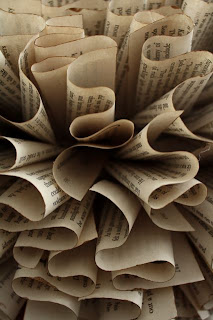"[...] So the artist, musician or author's challenge is to create a work that retains a freshness, according to Case Western Reserve University's Michael Clune, in his new book,
Writing Against Time (Stanford University Press). And, for the artist, musician or writer, creating this newness with each work is a race against 'brain time.'
Clune explains how neurobiological forces designed for our survival naturally make interest in art fade. But the forces don't stop artists from trying for timelessness.
While the phenomenon is true for all art, the assistant professor of English focuses on the intersection of literature and science, describing what writers can do to block or slow that natural erosion over time."
—
Science Daily
Read more...
"My task which I am trying to achieve is, by the power of the written word,
to make you hear, to make you feel—it is, above all, to make you see."
—Joseph Conrad
"At this very moment, as your eyes are scanning across the words in front of you, you're performing a feat of mental gymnastics that no other species on earth can approach.
Mere milliseconds after the photons leaping from the screen hit your retinas, you not only recognize the words and letters, but you extract meaning from them. Before a second has passed, you've assembled an idea of what the sentence as a whole means, and as a result, you can make inferences that are unstated; you can prepare an appropriate response; and you can even predict what word is going to come potato.
I mean, 'next.' How you do this -- how you make meaning out of photons or sound waves -- is one of the great, persistent mysteries of the human mind. And until recently, we had no idea how our brains make meaning. And worse, we didn't even know how to figure it out. But that's all changing."
— Benjamin K. Bergen,
Huffington Post
Read more...



